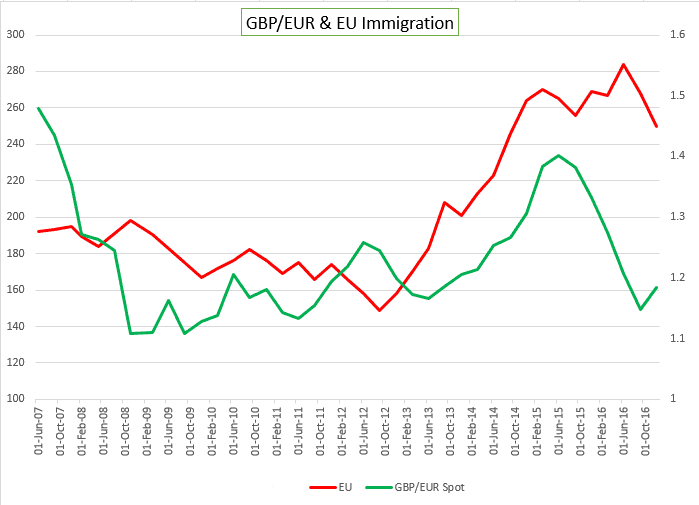EU Workers Shun UK Because of the British Pound

Evidence suggests that it is the value of the Pound that is behind the fall in EU immigration over the course of the past year - not those big, bad Brexiters as is the common explanation forwarded by some sections in the Brexit debate.
A recent report from an organisation representing recruitment agencies has highlighted how a growing number of employers are complaining about staff shortages directly as a result of a falling in EU workers coming to the UK.
The Recruitment and Employment Confederation (REC) said staff availability had suffered its sharpest fall in over a year and half, in July.
The lack of staff is being blamed on a reduction in EU workers, as a growing number decide to stay or return home following Brexit - it has major implications for wages, the wider economy, the debate about Brexit and Sterling.
"The parts of the economy most reliant on European workers are under even more pressure," said REC Chief Executive Kevin Green.
The reasons for the fall are complex with those on the Remain side of the Brexit debate arguing there is a negative perception amongst EU workers towards the UK.
But, we find the real reason is almost certainly economic.
For one, the rest of the EU is stronger economically than it was a few years ago so people are less desperate to come over and find work in the UK as more job openings become available across the continent.
The Value of the Pound
But we believe the main culprit for falling inward migration from the rest of Europe is the value of Pound Sterling.
The Pound is considerably weaker than it before Brexit ensuring the cost-benefit of leaving home to come to the UK to find work has increased considerably.
The chart below compares the GBP/EUR exchange rate with EU migration and shows a relatively tight correlation between the two.

We saw a sharp drop in EU immigration during the financial crisis of 2007-2009 when the Pound last fell to current levels against the Euro.
Note how both fell relatively sharply following the referendum vote in June 2016.
This probably also explains why there hasn't been a 'last chance saloon' spike in immigration from the EU before the as many thought might happen after the referendum - there is much less economic incentive to come over for the last few days.
The relationship between EU immigration and a strong Pound is closer than it is between overall immigration (EU, Non-EU and UK returning) and the Pound's trade weighted index (TWI).
This indicates that EU immigrants are more sensitive to fluctuations in the exchange rate compared to immigrants from elsewhere.
This is probably explained by the more complex resasons why Non-EU migrants come to the UK, e.g for asylum, because of the language, commonwealth links, existing family etc.

Falling Immigration Could Boost the Pound
If the fall in EU immigration is already causing a reduction in abvailable workers then how many fewer will there be as the time approaches for the actual end of membership in 2019, and then afterwards, assuming the government does in fact introduce a cap?
It suggests the lack of workers could become a major issue in the months running up to the actual day of Brexit.
This in turn could create a compelling economic argument for agreeing continued freedom of movement via a Switzerland or Norway style deal which would also see the UK remain in the single-market; a favoured outcome for markets and the Pound.
A growing awareness of the economic realities of a hard Brexit in which immigration was slashed overnight, could generate more political support for a 'softer Brexit' in the style of Norway or Switzerland which would strengthen Sterling.
However, falling immigration could also push wages up, which pushes inflation up which could prompt the Bank of England to raise interest rates.
And higher interest rates = a stronger Pound.
There is already evidence showing employers are having to tempt a dwindling number of candidates by upping their pay offers.
Starting salaries for permenant jobs are rising at their fastest pace for 20-months, for example, according to the same REC report which noted the fall in worker availability.
"Starting salaries are also still rising, so for workers who want to boost their earnings now is a good time to consider moving job," said REC's Green.
The evidence seems most compelling for gains at the lower wage end of the spectrum, in particular, although is more tenous for higher wage earners who might be negatively affected by the overall decline in the economy which a cut in immigration is expected to cause.
It is hard to argue against the economic logic that a fall in supply of workers will lead to a rise in wages, and the implications for Sterling are likely to be positive.
A lack of wage growth has been the most significant factor in restraining the Bank of England (BOE) from raising interst rates recently, despite surging inflation.
If wages start to push significantly higher due to the Brexit effect, however, the monetary policy committee are likely to vote to raise interest rates more rapidly.
Higher interst rates will boost the Pound as they will attract more capital inflows from investors seeking better rates of return on their money.




